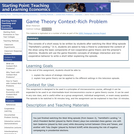
General overview of what economics is about. Video is 3 minutes long. Covers standard EPF.1
- Subject:
- Economics
- Social Science
- Material Type:
- Lecture
- Date Added:
- 10/20/2018

General overview of what economics is about. Video is 3 minutes long. Covers standard EPF.1

Entrepreneurship is the cornerstone of any modern economy - everyday, entrepreneurs around the world are starting their own business. This free online course from The E-Learning Network (TELNET) examines how entrepreneurs can surmount obstacles and also examines how business ideas can be developed and habits an entrepreneur must adopt to be a success. Upon completion of this course you will develop an understanding of obstacles entrepreneurs face and how to overcome them. You will gain a good knowledge of the development process and the planning process involved in the launch of a new product. You will have a good understanding of the business ecosystem and a knowledge of successful entrepreneurial habits. This course is ideal for anyone who wants to learn more about entrepreneurship or who may be thinking about starting their own business.

Normal and Inverted Futures Curves. Created by Sal Khan.

Futures Curves II. Created by Sal Khan.

What is the Futures Fair Value and how to traders use it as an indicator for stock price direction at market opening. Created by Sal Khan.

Futures Introduction. Created by Sal Khan.

Understanding the mechanics of margin for futures. Initial and maintenance margin. Created by Sal Khan.

Game theory enables rational insight into the basic principles of social interaction and has therefore become indispensable for economic and social sciences. Whether in politics, sports or medicine, modelling problems as a strategic game helps in decision-making in a variety of fields. With lecture snippets of Reinhard Selten, Robert Aumann and Alvin Roth, this Mini Lecture introduces to the mathematical beginnings of game theory, its socioscientific development and entrepreneurial integration.

How is the total value of all the goods and services produced in a country's economy measured? Gross domestic product (GDP) is one common and fairly comprehensive measure. The May 2013 issue explains GDP components and how GDP is calculated. It also describes what GDP does—and does not—measure.

GDP and Pizza: Economics for Life is designed to help students in civics, economics and other social studies classes grasp challenging economic content – and to explain why these topics are important for citizens to understand.

The GDP deflator is a way of adjusting nominal output to get the real value of output. In this video, get an intuitive explanation of the GDP deflator and learn how to calculate the GDP deflator. Created by Sal Khan.

Die Mini Lecture "Global Financial Crisis" thematisiert Ursachen und Lösungsansätze der globalen Finanzkrise, die die Welt 2007 erschütterte. Auszüge aus den in Lindau gehaltenen Vorträgen von Robert Mundell, Christian Wulff und Joseph Stiglitz werden gezeigt.

The Mini Lecture "Global Financial Crisis" addresses causes and possible solutions of the global financial crisis that hit the world in 2007 with lecture snippets of Robert Mundell, Christian Wulff and Joseph Stiglitz.

Este Produto Educacional é uma ferramenta didática que foi elaborada para auxiliar professores da Educação Básica a planejar, elaborar e aplicar roteiros pedagógicos sobre o uso racional de energia elétrica e demais temáticas socioambientais vinculadas, visando a sensibilização dos alunos por meio da apreensão dos conteúdos direcionados a práticas sustentáveis de conservação de energia elétrica. Nele, o professor (a) encontrará um conjunto de ferramentas de apoio didático-pedagógico em forma de roteiros, com orientações e sugestões de como utilizá-los na Educação Básica com os alunos.

This course provides a rigorous treatment of non-cooperative solution concepts in game theory, including rationalizability and Nash, sequential, and stable equilibria. It covers topics such as epistemic foundations, higher order beliefs, bargaining, repeated games, reputation, supermodular games, and global games. It also introduces cooperative solution concepts—Nash bargaining solution, core, Shapley value—and develops corresponding non-cooperative foundations.

This course introduces students to the rudiments of game theory as practiced in political science. It teaches students the basic elements of formal modeling and strategies for solving simple games. Readings draw from introductory texts on game theoretic modeling and applied articles in American politics, international relations, and comparative politics.

This course is an introduction to game theory and strategic thinking. Ideas such as dominance, backward induction, Nash equilibrium, evolutionary stability, commitment, credibility, asymmetric information, adverse selection, and signaling are discussed and applied to games played in class and to examples drawn from economics, politics, the movies, and elsewhere.

This consists of a short essay to be written by students after watching the West Wing episode "Hartsfield's Landing." In it, students are asked to help a friend to understand the content of the show using the basic components of non-cooperative game theory and the prisoner's dilemma.

Would you like to play a game, Dr. Falken? Actually, this episode isn't really about games, or Matthew Broderick, or Thermonuclear War. But enough with the long references to 1983's best movie, War Games. Today Jacob and Adriene are going to teach you about Oligopolies, which are kind of like the monopolies that we talked about last week, except with more companies involved. Then we'll get to the games, or rather, the game theory. Which is all about how companies try to compete with each other in the real world.

This half-term course examines the choices that we make which affect others and the choices others make that affect us. Such situations are known as “games” and game-playing, while sounding whimsical, is serious business. Managers frequently play “games” both within the firm and outside it – with competitors, customers, regulators, and even capital markets! The goal of this course is to enhance a student’s ability to think strategically in complex, interactive environments. Knowledge of game theory will give students an advantage in such strategic settings. The course is structured around three “themes for acquiring advantage in games”: commitment / strategic moves, exploiting hidden information, and limited rationality.